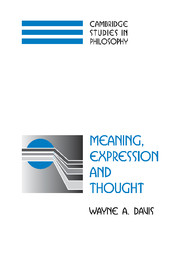Book contents
- Frontmatter
- Contents
- Preface
- 1 Introduction
- Part One Semantic Acts and Intentions
- Part Two Languages and Semantic Acts
- Part Three Thoughts and Ideas
- 12 Thought
- 13 Sentences, Propositions, and Thoughts
- 14 The Constituency Thesis
- 15 Ideas or Concepts
- 16 The Possession of Concepts
- 17 The Acquisition of Concepts
- 18 The Association of Ideas
- 19 Objects, Images, and Conceptions
- 20 The Language of Thought Hypothesis
- Part Four Ideational Theories of Meaning
- References
- Index
12 - Thought
Published online by Cambridge University Press: 20 July 2009
- Frontmatter
- Contents
- Preface
- 1 Introduction
- Part One Semantic Acts and Intentions
- Part Two Languages and Semantic Acts
- Part Three Thoughts and Ideas
- 12 Thought
- 13 Sentences, Propositions, and Thoughts
- 14 The Constituency Thesis
- 15 Ideas or Concepts
- 16 The Possession of Concepts
- 17 The Acquisition of Concepts
- 18 The Association of Ideas
- 19 Objects, Images, and Conceptions
- 20 The Language of Thought Hypothesis
- Part Four Ideational Theories of Meaning
- References
- Index
Summary
We have defined cogitative speaker meaning in terms of the expression of thoughts or ideas, and cognitive speaker meaning in terms of the expression of belief. Communication is the effective expression of beliefs, thoughts, or other mental states, and reference is the verbal expression of a certain range of ideas. Word meaning or expression in living languages has been defined in terms of conventional speaker meaning or expression. We turn our attention now to the fundamental notions of thought and ideation.
Belief, desire, and intention have received considerable attention in the philosophical literature. Occurrent thought as a specific propositional attitude has been generally neglected. The notion of an idea has long been suspect, moreover, and ideational theories of meaning are widely regarded as having been thoroughly discredited. It is necessary, therefore, to clarify the relevant notion of thought and ideation, and to respond to well-known objections. I will survey the principal similarities and differences between thought and belief, and stress the distinctive causal role of thought. We will look at the range of terms that express thought in English. While I can present only part of the case here, I hope to make it evident that conceptually, thought is as primitive as belief and desire, while ontologically it is more general and more fundamental. The often mentioned “belief-desire psychology” is really the “belief-desire-thought psychology.”
THE COGITATIVE SENSE OF THOUGHT
The word “thought” is at least doubly ambiguous. Like “belief,” “desire,” and “intention,” it suffers from the act-object ambiguity.
- Type
- Chapter
- Information
- Meaning, Expression and Thought , pp. 295 - 330Publisher: Cambridge University PressPrint publication year: 2002



